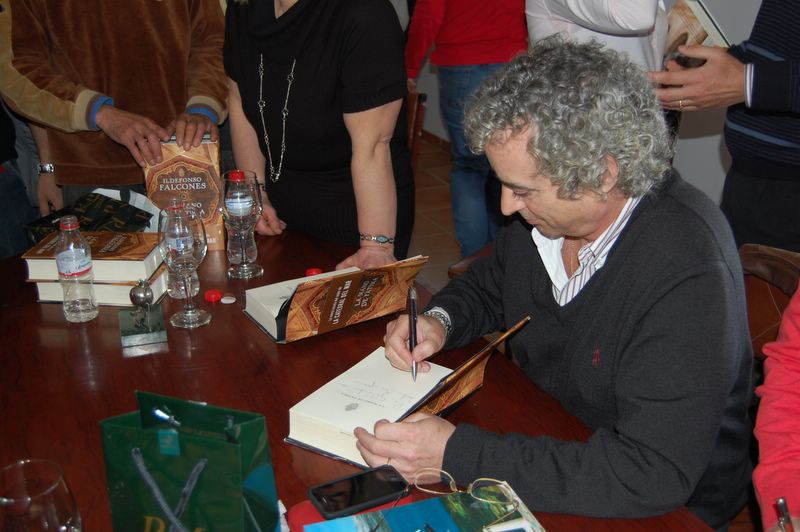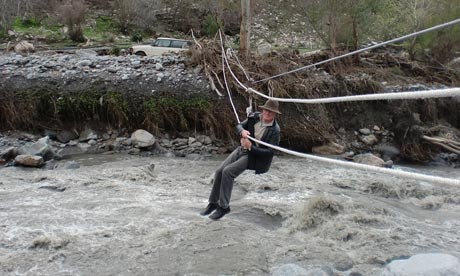Thanks again to Ken in Australia, who informs me our village is finally on Google Maps Street View. Beautiful winter sunshine, a little snow on the ground. It's early in the morning I think; there's nobody around apart from a couple in overcoats at the bus stop, who must be waiting for the 5.30 am to Granada. Even Google couldn't get a vehicle up our street, Calle Altillo, so you can't see our house. It's up the hill above the main drag, with breathtaking views, and it's still available to rent for most of the Autumn and Winter.
I was going to write "where next, Timbuctu?" but I checked and yes, Timbuctu already is on Street View.
You say tomato, I say tomate
Got an email from Australia today asking how you pronounce the name of our village, Juviles. A good question, and one I've not yet addressed on this blog. So here goes. As a rough approximation for English speakers, it's
hoo-BEE-lez
although as the locals tend to ignore the letter 's', it's often
hoo-BEE-lay
Anyway, it's not Jew-viles, Dew-villas or Jubblies. Nor is it, as at least one locally-resident English-speaker has it, Hoo-billies. Although I quite like Hoo-billies. Makes me think of the Beverly Hoo-billies....
I've no idea what Juviles means, if anything. The names of most villages here have an Arabic or Latin route that relates to the landscape, or the function or rank of the settlement. All I can find online is that Juviles is probably "pre-Arab". If anyone knows the derivation, I'd love to hear it.
hoo-BEE-lez
although as the locals tend to ignore the letter 's', it's often
hoo-BEE-lay
Anyway, it's not Jew-viles, Dew-villas or Jubblies. Nor is it, as at least one locally-resident English-speaker has it, Hoo-billies. Although I quite like Hoo-billies. Makes me think of the Beverly Hoo-billies....
I've no idea what Juviles means, if anything. The names of most villages here have an Arabic or Latin route that relates to the landscape, or the function or rank of the settlement. All I can find online is that Juviles is probably "pre-Arab". If anyone knows the derivation, I'd love to hear it.
Literary fame again
Juviles' starring role in La Mano de Fatima, the hugely successful historical novel by Ildefonso Falcones, continues to raise our village's literary profile. What with novel-clutching tourists on coach tours poking around the streets to see where all the moorish women were murdered, it's getting like Bronte Country, only with more ham. An English translation is promised for next year, and I wouldn't be surprised if someone is optioning movie rights. I've only managed the first dozen chapters (at 1,000 pages of dense Spanish it's a fairly daunting tome) and it strikes me as being somewhat overwritten, but the story of sectarian slaughter during the muslim rebellion of 1568 is fascinating. Falcones visited the village earlier this year (they named a street after him) and there are photos and a fairly amusing video on the ayuntamiento website. Here's the man himself signing copies of the novel for the eager bookworms of the high Alpujarra. This was probably before the obligatory tour of the ham factory.

Vegetarians look away now
A couple of posts ago I wrote about the Christmas pig slaughter in the village. Quite apart from providing masses of delicious pork products, the matanza is an important social event, drawing dozens of people together to work, eat and party as the pig meets his doom and the sausages take shape. Here, courtesy of the town hall website, is a series of 93 pictures of a matanza held on the 1st and 2nd January this year. Along with fairly gruesome shots of pigs' innards spilling out of carcasses and old women up to their elbows in blood while they make black pudding, there are lots of images conveying the infectious, convivial atmosphere. In this one below, I think we see the vet (who is legally required to attend the slaughter) doing an analysis with his microscope. Surrounded by kids, and plied with wine. I love rural Spain! 

Check my stratus
 Annie bought me a fascinating little book recently, called The Cloud Collector's Handbook. I started my collection with these lovely stratus clouds seen from the roof terrace of our house. It looks like someone in Cástaras has left a dry ice machine running after a heavy metal gig.
Annie bought me a fascinating little book recently, called The Cloud Collector's Handbook. I started my collection with these lovely stratus clouds seen from the roof terrace of our house. It looks like someone in Cástaras has left a dry ice machine running after a heavy metal gig.

The rain in Spain falls mainly in the Alpujarra
 It's hardly stopped raining since Christmas in the Alpujarra. Here, where drought and forest fires are more often the cause for worry than the occasional drop of precipitation, reservoirs are overflowing, rivers are bursting their banks and roads and bridges have been washed away. Here's a link to Chris Stewart's Guardian article about it. We're off there at the weekend, and I'm hoping the past few days of dry weather bodes well for a nice week ahead. At least with all that rain, the place will be beautifully green and should stay that way all summer - for which we still have plenty of availability for rental.
It's hardly stopped raining since Christmas in the Alpujarra. Here, where drought and forest fires are more often the cause for worry than the occasional drop of precipitation, reservoirs are overflowing, rivers are bursting their banks and roads and bridges have been washed away. Here's a link to Chris Stewart's Guardian article about it. We're off there at the weekend, and I'm hoping the past few days of dry weather bodes well for a nice week ahead. At least with all that rain, the place will be beautifully green and should stay that way all summer - for which we still have plenty of availability for rental.
Bonbon el perro
 You don't need a dog in the Alpujarra, as you can always borrow one - it's a bit like that scheme with free bikes in Paris. We went for a walk in the hills above Juviles the other day and this little sweetie joined us. He was thrilled to accompany us on a circular route that took in the rocky gorse-lined path that leads to the pantaneta, then rejoins the careterra to return into the village by the cemetery. It's a lovely forty minutes or so, perfect for a miserable day when you want to get out, but you don't want to stray too far away from your fire in case you get soaked. Anyway, Bonbon (as we named him, after the dog in that Argentine movie) clearly knew this circuit, and was not prepared to have us deviate from it. When at one point we considered going back the way we came, he got quite cross with us, barking and herding us in the "right" direction.
You don't need a dog in the Alpujarra, as you can always borrow one - it's a bit like that scheme with free bikes in Paris. We went for a walk in the hills above Juviles the other day and this little sweetie joined us. He was thrilled to accompany us on a circular route that took in the rocky gorse-lined path that leads to the pantaneta, then rejoins the careterra to return into the village by the cemetery. It's a lovely forty minutes or so, perfect for a miserable day when you want to get out, but you don't want to stray too far away from your fire in case you get soaked. Anyway, Bonbon (as we named him, after the dog in that Argentine movie) clearly knew this circuit, and was not prepared to have us deviate from it. When at one point we considered going back the way we came, he got quite cross with us, barking and herding us in the "right" direction.
Subscribe to:
Posts (Atom)



